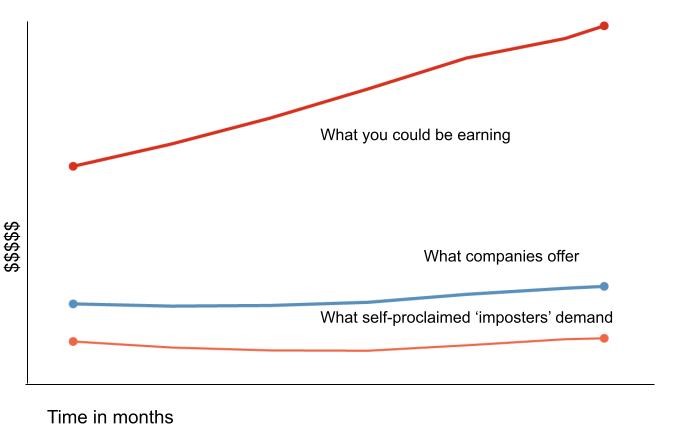Did you linger over our Developer Salary Reports series and think, ‘I can’t possibly earn that much?' You’re not alone. Our collected data shows that developers tend to undervalue their work and expect less than what companies offer. This trend is noticeable in countries such as Switzerland, Germany, and the Netherlands.
Some call it imposter syndrome, the self-proclaimed assertion that you don’t deserve to be where you are. Imposter syndrome is a self-harming bias that affects people in all kinds of professional fields. We’ll try to help you overcome it using… data. Yes, we’ll use actual figures to help you understand YOUR imposter syndrome and strive in your professional environment without debilitating self-doubt.
See how developer salaries in Germany compared to other countries.
The extent of imposter syndrome for developers
Many people dubbed as ‘experts’ in their field suffer from imposter syndrome, a psychological occurrence that makes people question their competence and knowledge. People experiencing imposter syndrome believe that they are ‘frauds’ and will soon be exposed as such. Some data suggest that women and BIPOC people are more likely to experience imposter syndrome. A paper published in 1978 discusses the imposter phenomenon in high-achieving women.
Today, we have a lot of ways to determine if software developers suffer from imposter syndrome. For example, earlier this year, we investigated how Data Engineers negotiated their salaries and discovered that people often underestimate their work in many European countries.
The median offered remuneration in Europe is higher than the median projected income, which runs counter to the common belief that companies seek to lowball candidates. The average income offered is much higher than the average anticipated salary. This means that the typical offer is better than what developers expect. Thinking you are worth less and actively asking less than what you're worth is just another manifestation of the imposter syndrome.
Why developers are prone to imposter syndrome
According to a book published in 2020 Build a Career in Data Science by Emily Robinson and Jacqueline Nolis, the imposter syndrome ‘is especially common’ in data science. ‘Depending on whom you ask,’ the authors say, ‘a data scientist is some combination of an analyst/statistician/engineer/machine learning pro/visualizer/database specialist/business expert,’ explaining that each discipline ‘is a deep position’ in its own right.
The authors’ research is based on this premise: Since working in software, data analytics may involve switching between tasks (and striving to catch up with the latest techniques) way too frequently. So, developers or data scientists find themselves believing that they know too little about it.
On the other hand, programming often moves without a defined course. It's a team endeavor that demands frequent input, which might make workers feel incompetent. Feeling like an 'imposter' might be exacerbated if a developer thinks their work isn't up to par or isn't valued by their peers. All these reasons might make software developers and data scientists feel like they’re not up to the task.
How to deal with imposter syndrome
Now that you know what imposter syndrome is, let’s look at how you can handle it. Most importantly, you must understand that there is a difference between feelings of self-doubt and feelings of fraudulence and inadequacy.
Here are a few tips to help you deal with imposter syndrome:
Browse through the available data.
We’re not asking you to delve into your mind and kick the murmuring devil out. You should check out our Salary Report series. It might make you feel less alone. Throughout Europe, even for newcomers to the realm of software development, companies want to pay more than what candidates ask for. For data scientists, for example, we found out that there’s almost always a difference between expectations and reality.
Take credit for your successes.
Those who suffer from imposter syndrome may constantly minimize their achievements, especially in social situations. You may feel unworthy of your current position and worry that others will attribute your success to chance. That's why it's crucial to take credit for your successes. Acknowledge your accomplishments, and hey, share them!
Request feedback.
We once explored how developers are in some sense 'lone wolves' who love working by themselves. Don’t let that impression become a self-fulfilling prophecy. Receiving constructive criticism from superiors and peers is a great way to fight against imposter syndrome. They can provide insightful criticism of your work and suggest ways you can improve. Accept criticism as a means to better yourself, don’t see it as an attack on your skills.
Talk to experts.
Therapy is helping many people all over the world. Cognitive behavioral therapy aims to help patients become more aware, and eventually free themselves from destructive patterns. Speaking about your imposter syndrome can be pretty challenging. Still, according to the book Essential Psychotherapies, Fourth Edition: Theory and Practice by Stanley B. Messer and Nadine J. Kaslow, cognitive behavioral therapy (CBT) has shown promising results.
Share your feelings with your circle.
If you glance over your shoulder and check in with a colleague, or friend, you might realise that you’re not alone. Discussing these sorts of fears and anxieties with others might help you open up in a liberating and comforting way.
See how Nana, the DevOps Queen from TechWorld with Nana, dealt with her own imposter monster.
In conclusion…
It's important to underline that the imposter syndrome isn't just a theoretical concept; it's a genuine problem that many people in programming, data science, and many other professional fields experience. Understanding the cause and effect is crucial for identifying possible symptoms. These symptoms can range from depression to anxiety attacks, and seeking out effective coping mechanisms is crucial.

Recognizing the signs of imposter syndrome is essential. Don't forget that every time you give in to your alleged fraudster persona, you're compromising both your self-worth and your wallet.


